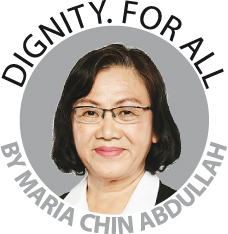DISINFORMATION is one of the biggest threats to our democracy. It has the potential to spread uncontrollably like wildfire and compromise our democratic institutions. In Malaysia, we have witnessed coordinated disinformation campaigns especially on social media platforms that have led to the failure of policies like the ratification of the International Convention on the Elimination of All Forms of Racial Discrimination (ICERD) and the Rome Statute. It has also led to the mass dissemination of hurtful hateful messages targeting different communities in our multiracial, multicultural and multireligious society.
Recent examples of misinformation, include:
» the road rage incident at Bangi that resulted in the death of a man. Several groups had manipulated the incident by saying that the incident was racially motivated.
» outdated postings including those from overseas on hanging the national flag upside down.
» fake images of a white paper to Parliament by the Inland Revenue Board (IRB) circulating on social media showing a breakdown of taxes paid according to racial breakdown.
Within the last year, disinformation has dominated the social and political landscape resulting in dangerous narratives. What these examples are telling us is how misinformation has become a societal challenge requiring action not just from technology companies, civil society actors, and internet users, but also the government.
The spread of disinformation is important to us all because it takes away our right to engage in healthy political conversations and to live in a democracy that is free from discrimination, hatred, censorship and abuse.
Instead of seeking understanding and resolution, cybertroopers and online keyboarders generated misinformation that further polarised and disrupted unity, for example the issue of making khat mandatory in vernacular schools was quickly perceived as “backdoor” religious and racial intervention.
Perhaps better understanding could have been struck before the introduction to produce a better narrative that unites rather than divide. It is not only political fake news that is spreading like this. The unprecedented and alarming rise in the anti-vaccine campaign for instance is also due to disinformation.
Anti-vacciners associate vaccines with diseases such as stunted growth while some have even raised concerns about it being not-halal. In May, the Ministry of Youth and Sports had banned a group from using a government-owned youth centre after it was revealed that they were planning to use it to organise an anti-vaccination seminar.
In this case, disinformation has resulted in the rise of diseases that were once under control such as measles, rubella, meningitis and more. It has also caused the deaths of children which was completely preventable.
The Health Ministry has in response established the Disease Control Division and the Family Heath Development Division with the aim of making immunisations mandatory under law. However, the fear of immunisation persists because the problem of disinformation has not been addressed even as the government tries to fight this head on with facts.
The use of half-truths, misinformation and non-rational arguments to manipulate public opinion is a serious threat to our society. It is therefore our collective responsibility to speak up against this.
Politicians must speak up against disinformation and not play into this.
Going back to the ICERD example, Rembau MP Khairy Jamaluddin had in his speech in Parliament on Oct 15, 2018, sought clarification from the government on the effect of the ratification on Article 153 of the Federal Constitution. The argument over Article 153 was later used by the Anti-ICERD Rally organisers to mobilise supporters to take to the streets of Kuala Lumpur.
Article 153 (1) of the Federal Constitution states that it is the “responsibility of the Yang di-Pertuan Agong to safeguard the special position of the Malays and natives of any of the States of Sabah and Sarawak and the legitimate interests of other communities in accordance with the provisions of this Article.”
Article 153 (2) states that the Yang di-Pertuan Agong is required to “safeguard the special position of the Malays and natives of any of the States of Sabah and Sarawak and to ensure the reservation for Malays and natives of any of the States of Sabah and Sarawak of such proportion as he may deem reasonable of positions in the public service (other than the public service of a State) and of scholarships, exhibitions and other similar educational or training privileges or special facilities given or accorded by the Federal Government and, when any permit or licence for the operation of any trade or business is required by federal law, then, subject to the provisions of that law and this Article, of such permits and licences.”
However, despite the government, the Bar Council and civil society organisations later clarifying that the provisions of Article 153 were not incompatible with ICERD as stated under Articles 1 (4) and 2 (2) of the Convention, Khairy missed the opportunity to speak out against the spread of disinformation even as other opponents of ICERD regularly used Article 153 to rally support against ICERD.
While the government struggled to get its explanation out to the public quickly, it does not erase the fact that public outrage over the treaty was spurred by inaccurate information about the implication of ICERD over our laws and its impact on our society.
As recently as Aug 19, Khairy surprisingly continues to blame the failure of ICERD on the “attitude” of the minister of foreign affairs instead of speaking up against the spread of disinformation itself. Politicians with large social media followings must lead by example to ensure that the pollical discourse is not abused.
Several countries including the previous Malaysian government have sought to tackle disinformation through the disingenuous introduction of “Anti-Fake News” Laws.
Nobody wants another Anti-Fake News Act as such a legislation is open to abuses and will allow the government greater censorship over speech. Putting aside our experiences with the Anti-Fake News Law, even other countries have struggled with it. The German Network Enforcement Act for example had a hard time differentiating misinformation and hate speech from political satire.
A long-term approach to the problem would be to educate young students on how to identify false content on the internet. This would require the cooperation of teachers, parents, media practitioners and the government.
France for instance has started a voluntary programme for schools that teaches children about “source literacy”. Children are exposed to different articles on the internet and taught how to identify if the content is true with the help of experts.
The United Kingdom announced in July that there would be new content added to school curricula to teach children how to spot misinformation online.
Civil society can create an awareness about disinformation and teach the public how to identify false news. Brussels-based NGO Lie Detectors for example sends journalists to schools across Europe for this purpose. This can be emulated in Malaysia. The Ministry of Communications and Multimedia could lead the way by offering grants and supporting programmes that are aimed at countering disinformation.
We should also consider legislation that makes it clear whenever messages from political parties are sent out to the public. When it comes to election time, the Election Commission should make it illegal for political parties to spread messages through proxies and any attempts by political parties to spread information with the intention to mislead the public must be met with harsher penalties.
In Canada, the “Critical Election Incident Public Protocol” was also set up to monitor and notify other agencies and the public about disinformation attempts. This type of coordination between different government agencies is crucial and I would encourage the government to look into this as a means of setting up a centralised agency in its war against disinformation.
The speed, scale and reach of disinformation is frightening, and we must learn to stop it. However, when it comes to curbing disinformation, we cannot just rely on self-regulation because we need to ensure there is accountability. What can be done however is to empower Malaysians with knowledge about where their messages are coming from. To do this, we must speak out against disinformation whenever we encounter it.
Comments: letters@thesundaily.com















